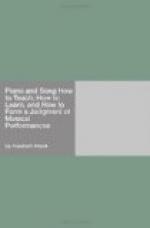(Mr. Forte storms through various unconnected chords with the greatest rapidity, with the pedal raised; and passes without pause to the F sharp minor mazourka. He accents vehemently, divides one bar and gives it two extra quarter notes, and from the next bar he omits a quarter note, and continues in this manner with extreme self-satisfaction till he reaches the close; and then, after a few desperate chords of the diminished seventh, he connects with it Liszt’s Transcription of Schubert’s Serenade in D minor. The second string of the two-lined b snaps with a rattle, and there ensues a general whispering “whether the piece is by Mendelssohn, or Doehler, or Beethoven, or Proch, or Schumann,” until finally Mr. Silver mentions Schubert’s Serenade. Mr. Forte concludes with the soft pedal, which in his inspired moments he had already made frequent use of.)
DOMINIE (to Emma). You should never play in company, without mentioning previously what you are going to perform. You observe, as soon as the Serenade was mentioned, it put a stop to the guessing.
ALL (except Mr. Silver and Dominie). What a glorious performance! what an artistic treat!
MRS. GOLD. What spirituality in his playing!
MR. SILVER (asking Mr. Forte for information). I noticed, in the Serenade, you made only one bar of the two where it modulates to F major, in your rapid playing of the passage. Was that accidental?
EMMA (aside). He ought to have played a little slower just there.
MR. FORTE. In such beautiful passages, every thing must be left to the suggestion of one’s feelings. Perhaps another time I may make three bars, just as inspiration and genius may intimate. Those are aesthetic surprises. Henselt, Moscheles, Thalberg, and Clara Wieck do not execute in that manner, and consequently can produce no effect, and do not travel.
DOMINIE (to Emma). I hope that your natural taste and your musical education will preserve you from such preposterous extravagances.
EMMA. Such playing makes one feel quite uncomfortable and worried. Probably that is what you call “devilish modern”?
DOMINIE. Yes.
EMMA. But do people like it?
DOMINIE. Certainly: a great many people do. It has the superior air of genius, and sounds very original.
(Mrs. Gold has “The Creation” in her hand, and Mr. Silver leads her to the piano for the execution of the grand duet between Adam and Eve. Mr. Forte is exhausted, and Dominie plays the accompaniment. Mr. Silver sings intelligently and unaffectedly; Mrs. Gold, as before, but with still less regard to time, and more out of tune; but she tries to compensate for this by introducing very long ornaments at the fermate_ in the allegro, sung with her thin, piercing, over-strained voice; and she frequently rolls up her black eyes. At the conclusion, Mrs. Gold was led to the arm-chair, in great exhaustion of feeling._)
MR. PIOUS. The divine art of music celebrates its perfect triumph in such interpretations of Haydn. Mrs. Gold, were those delicious fermate of your own invention?




